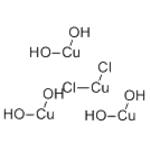Bluish-green powder. Odorless
core: copper
reagent type: catalyst
Fungicide: Used to control fungi on beets, fruit crops, grapes,
olive trees, potatoes, vegetables, tomatoes, ornamental
plants and many more. Used as a bird repellant.
AGRIZAN®; BASF® GRUNKUPFER;
BLITOX®; BLITOX® 50; BLUE COPPER-50®;
CHEMOCIN®; CHEMPAR®; COBOX®; COBOX
BLUE®; COLLOIDOX®; COPPERSAN®;
COPPESAN®; COPPESAN BLUE®; COPRANTOL®;
COPREX®; COPROSAN BLUE®; COP-TOX®;
COXYSAN®; CU-56®; CUPRAL 45®; CUPRAMAR®;
CUPRAMER®; CUPRANTOL®; CUPRAVET®;
CUPRAVIT®; CUPRAVIT® FORTE; CUPRAVIT
GREEN®; CUPRICOL®; CUPRITOX®; CUPROKYLT®;
CUPROL®; CUPROSAN®; CUPROSANA®;
CUPROSAN BLUE®; CUPROVINOL; CUPROX®;
CUPROXOL®; DEVICOPPER®; FALIGRUEN®;
FYCOL 8®; FYTOLAN®; KAURITIL®; KILEX®;
KT 35®; KUPRICOL®; KUPRIKOL®; MICROCOP®;
MIEDZIAN®; MIEDZIAN 50®; NEORAM
BLU®; OXICOB®; OXIVOR®; OXYCLOR®;
OXYCUR®; PARRYCOP®; PEPROSAN; RECOP®;
RHODIACUIVRE®; SUTOX®; TAMRAGHOL®;
TRICOP 50®; VIRICUIVRE®; VITIGRAN®; VITIGRAN
BLUE®
Used to control fungi on beets, fruit crops, grapes, olive trees, potatoes, vegetables, tomatoes, ornamental plants, and many more. Used as a bird repellant
UN3077 Environmentally hazardous substances, solid, n.o.s., Hazard class: 9; Labels: 9-Miscellaneous hazardous material, Technical Name Required.
When heated to decomposition or on contact with acids or acid fumes, may produce highly toxic chloride fumes and deadly phosgene gas. May cause pitting of some metals
Copper-containing wastes can be concentrated through the use of ion exchange, reverse osmosis, or evaporators to the point where copper can be electrolytically removed and sent to a reclaiming firm. 916 Copper Oxychloride Details of copper recovery from a variety of industrial wastes have been published. If recovery is not feasible, the copper can be precipitated by the use of caustics and the sludge de posited in a chemical waste landfill. Recommendable methods: Precipitation, solidification, landfill, discharge to sewer, & incineration. Peer-review: Precipitate copper with alkali, filter, solidify precipitate. (Do not use ammonia as alkali). Cation exchange will allow recovery of copper. Eluate from cation exchanger can be passed through anion exchanger to remove (or reduce) naphthenic acid content. Exhausted ion exchange resins can be landfilled. (Peer-review conclusions of an IRPTC expert consultation)


